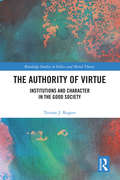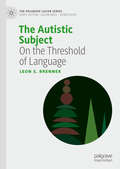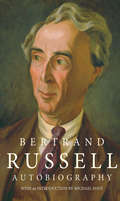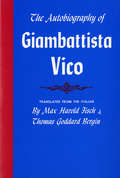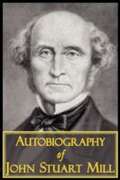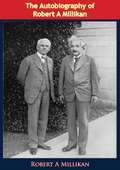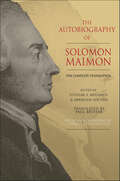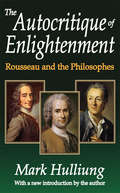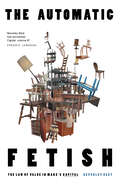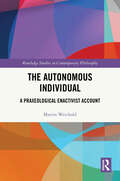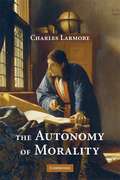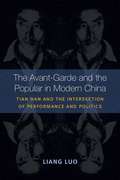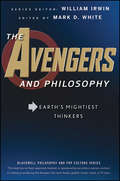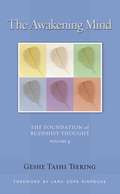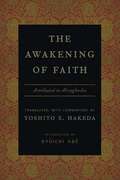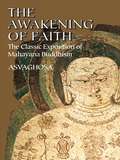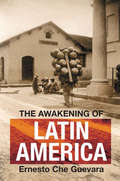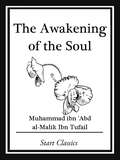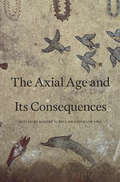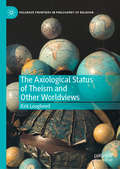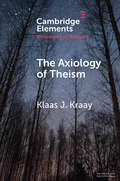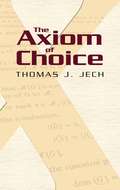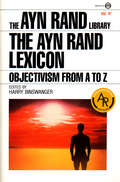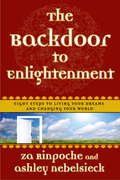- Table View
- List View
The Authority of Virtue: Institutions and Character in the Good Society (Routledge Studies in Ethics and Moral Theory)
by Tristan J. RogersThis book provides a unified account of the connection between justice and the good life. It argues that the virtues of character require institutions, while good institutions enable persons to live together virtuously. Although virtue ethics and political philosophy are rich and sophisticated philosophical traditions, there has been an unfortunate divergence, in theory and practice, between the virtues of character and the virtues of institutions. This book has two primary purposes. First, it reorients political philosophy around the concept of the good life. To do so, the author addresses the problem of political authority from a virtue ethics perspective. He also considers whether a political theory oriented around the good life is compatible with Rawls’s notion of reasonable pluralism. Second, the book explains the relationship between the virtues of institutions and the virtues of character. The author shows how institutions support the development and exercise of the virtues of character, while examining specific other-regarding virtues such as justice and friendship. The Authority of Virtue will appeal to scholars and advanced students working in virtue ethics, social and political philosophy, ancient philosophy, and political theory.
The Autistic Subject: On the Threshold of Language (The Palgrave Lacan Series)
by Leon S. BrennerThis book presents a theory of autistic subjectivity from a Lacanian psychoanalytic perspective. Dr. Brenner describes autism as a singular mode of being that is fundamentally linked to one’s identity and basic practices of existence, offering a rigorous alternative to treating autism as a mental or physical disorder. Drawing on Freud and Lacan’s psychoanalytic understanding of the subject, Brenner outlines the unique features of the autistic subjective structure and provides a comprehensive synthesis of contemporary work on the psychoanalysis of autism. The book examines research by theorists including Jean-Claude Maleval, Éric Laurent, Rosine and Robert Lefort that has been largely unavailable to Anglophone audiences until now. In this book autism is posited to be a singular subjective structure not reducible to neurosis or psychosis. In accordance with the Lacanian approach, autism is examined with detailed attention to the subject’s use of language, culminating in Brenner’s “autistic linguistic spectrum.” A compelling read for students and scholars of psychoanalysis and autism researchers and clinicians.
The Autobiography of Bertrand Russell: 1944-1967 (Routledge Classics Ser.)
by Bertrand RussellBertrand Russell was born in 1872 and died in 1970. One of the most influential figures of the twentieth century, he transformed philosophy and can lay claim to being one of the greatest philosophers of all time. He was a Nobel Prize winner for Literature and was imprisoned several times as a result of his pacifism. His views on religion, education, sex, politics and many other topics, made him one of the most read and revered writers of the age. This, his autobiography, is one of the most compelling and vivid ever written. This one-volume, compact paperback edition contains an introduction by the politician and scholar, Michael Foot, which explores the status of this classic nearly 30 years after the publication of the final volume.
The Autobiography of Giambattista Vico
by Giambattista Vico Thomas Goddard Bergin Max Harold FischThe Autobiography of Giambattista Vico is significant both as a source of insight into the influences on the eighteenth-century philosopher's intellectual development and as one of the earliest and most sophisticated examples of philosophical autobiography. Referring to himself in the third person, Vico records the course of his life and the influence that various thinkers had on the development of concepts central to his mature work. Beyond its relevance to the development of the New Science, the Autobiography is also of interest for the light it sheds on Italian culture in the seventeenth and eighteenth centuries.Still regarded by many as the best English-language translation of this classic work, the Cornell edition was widely lauded when first published in 1944. Wrote the Saturday Review of Literature: "Here was something new in the art of self-revelation. Vico wrote of his childhood, the psychological influences to which he was subjected, the social conditions under which he grew up and received an education and evolved his own way of thinking. It was so outstanding a piece of work that it was held up as a model, which it still is."
The Autobiography of John Stuart Mill
by John Stuart MillJohn Stuart Mill's Autobiography, published posthumously, is an honest account of the education of this great thinker of the nineteenth century. It is an amazing account of an extraordinary life.
The Autobiography of Robert A Millikan
by Robert A. MillikanRobert Millikan tells his story in his own words. “This book represents an effort to record and appraise some of the changes which have come under the eyes of one particular observer of the rapidly changing scene. I shall begin, however, in 1825, some forty years before my birth.”“The Autobiography of Robert A. Millikan is one of the most outstanding works of its kind done by an American man of science. The treatment is lucid and brings out in clear relief not only the activities of the man himself but of those, and there are many, with whom he has associated and collaborated in the fields of teaching, research, and administration. The autobiography is that of a dynamic personality associated with patience, persistence and enthusiasm. The treatment is free from egotism and refreshingly frank and forthright.” — B. J. Spence, American Journal of Physics“Robert Andrews Millikan is one of the most distinguished physicists in the world and his autobiography will interest not only the entire scientific world, but the reading public at large... It is refreshing and helpful for younger [scientific] workers to read... that only after many discouraging attempts did [Millikan’s] great researches on the determination of the electronic charge and his proof of the Einstein photoelectric law emerge.” — Robert S. Shankland, Physics Today“It is seldom that a man is so successful in getting his personality into his own writing about himself... The book is much more than the record of the life of one man,... it is a history of the physics of his time, and as such will find its place among the other histories of the most memorable decades that physics has yet experienced.” — P. W. Bridgman, Science
The Autobiography of Solomon Maimon: The Complete Translation
by Solomon MaimonThe first complete and annotated English translation of Maimon’s influential and delightfully entertaining memoirSolomon Maimon's autobiography has delighted readers for more than two hundred years, from Goethe, Schiller, and George Eliot to Walter Benjamin and Hannah Arendt. The American poet and critic Adam Kirsch has named it one of the most crucial Jewish books of modern times. Here is the first complete and annotated English edition of this enduring and lively work.Born into a down-on-its-luck provincial Jewish family in 1753, Maimon quickly distinguished himself as a prodigy in learning. Even as a young child, he chafed at the constraints of his Talmudic education and rabbinical training. He recounts how he sought stimulation in the Hasidic community and among students of the Kabbalah--and offers rare and often wickedly funny accounts of both. After a series of picaresque misadventures, Maimon reached Berlin, where he became part of the city's famed Jewish Enlightenment and achieved the philosophical education he so desperately wanted, winning acclaim for being the "sharpest" of Kant's critics, as Kant himself described him.This new edition restores text cut from the abridged 1888 translation by J. Clark Murray, which has long been the only available English edition. Paul Reitter's translation is brilliantly sensitive to the subtleties of Maimon's prose while providing a fluid rendering that contemporary readers will enjoy, and is accompanied by an introduction and notes by Yitzhak Melamed and Abraham Socher that give invaluable insights into Maimon and his extraordinary life. The book also features an afterword by Gideon Freudenthal that provides an authoritative overview of Maimon's contribution to modern philosophy.
The Autocritique of Enlightenment: Rousseau and the Philosophes
by Mark HulliungOf all the critiques of the Enlightenment, the most telling may be found in the life and writings of Jean-Jacques Rousseau. This searching, long overlooked auto critique receives its first full treatment by Mark Hulliung. Here he restores Rousseau to his historical context, the world of the philosophes, and shows how he employed the arsenal of Voltaire, Diderot, and others to launch a powerful attack on their version of the Enlightenment.With great intellectual skill and rhetorical force, Rousseau exposed the inconsistencies and shortcomings of the Enlightenment: the psychology of Locke, the genre of philosophical and conjectural history, the latest applications of science to the study of society and politics, and the growing interest in materialist modes of thought. As the century moved on, Hulliung shows, the most advanced philosophes found themselves drawn to conclusions that paralleled Rousseau's an agreement that went unacknowledged at the time. The Enlightenment that emerges here is richer, more nuanced, and more self-critical than the one reflected in many interpretations. By extracting Rousseau from personal entangle-ments that stymied debate in his time and that mislead critics to this day, Hulliung reveals the remarkable and remarkably unacknowledged force of Rousseau's accomplishment. This edition includes a brilliant new introduction by the author.
The Automatic Fetish: The Law of Value in Marx's Capital
by Beverley BestWhy you should read all three volumes of Marx's Capital togetherThe Automatic Fetish recreates Marx's analysis of capital, step-by-step, through the material compiled posthumously as Capital, Volume three. Identifying the critique of value as the central through-line of the analysis, Best elaborates Marx's theory of value as a theory of movement through which the capital-machine generates social forms of appearance that are the inversions of its inner operating mechanisms.Characterizing capital&’s movement and the dynamic production of social form as a 'perceptual physics,' Best demonstrates the consistency and the coherency with which Marx's theory of value orients all trajectories of analysis in Capital 3, as well as providing the conceptual bridge between Volumes on.The book illustrates the way in which capital&’s development to this day is as much as a story of the continuity of capital's inner dynamics as it is a story of ongoing transformation of capital's surface-forms.Best develops, through Marx's critique, an analysis of money, credit, crisis, and the derivatives of profit-interest and ground-rent, that takes the reader from their emergence as capitalist forms to their current expressions. Neither a back-to-basics nor newfangled reconstruction, The Automatic Fetish eschews novelty to show why, once again, Marx deserves to be read carefully.
The Autonomous Individual: A Praxeological Enactivist Account (Routledge Studies in Contemporary Philosophy)
by Martin WeicholdThis book advances a new theory of what it means to be an autonomous individual with free will and an authentic self. It synthesizes the new “action turn” from 4E cognitive science with the new “practice turn” from the social sciences to develop a new perspective on our self-interpretation as autonomous individuals.Our entire life is built upon one central foundation: the idea that we human beings are autonomous individuals. While this idea is presupposed in some academic fields, such as law and moral philosophy, it is challenged or denied in others. This book aims to move beyond debates about whether free will exists. Instead, it proposes that the idea that human beings are autonomous individuals is a culturally developed self-interpretation that is permanently enacted in social practices. Parts of it describe biological reality correctly, parts are social reality, and parts are mere fictions. This view – which the author calls "praxeological enactivism" – combines work from enactive cognitive science with practice theory from the social sciences. The book concludes by discussing the ethical advantages and dangers of the idea of the autonomous individual.The Autonomous Individual will appeal to philosophers working on free will and autonomy, moral philosophy, and philosophy of social sciences, as well as scholars and advanced students in disciplines such as cognitive science, sociology, cultural theory, and philosophical anthropology.
The Autonomy of Morality
by Charles LarmoreIn The Autonomy of Morality Charles Larmore challenges two ideas that have shaped the modern mind. The world, he argues, is not a realm of value-neutral fact, nor does human freedom consist in imposing principles of our own devising on an alien reality. Rather, reason consists in being responsive to reasons for thought and action that arise from the world itself. Larmore shows that the moral good has an authority that speaks for itself. Only in this light does the true basis of a liberal political order come into view, as well as the role of unexpected goods in the makeup of a life lived well.
The Avant-garde And The Popular In Modern China: Tian Han And The Intersection Of Performance And Politics
by Liang LuoThe Avant-Garde and the Popular in Modern China explores how an important group of Chinese performing artists invested in politics and the pursuit of the avant-garde came to terms with different ways of being "popular" in modern times. In particular, playwright and activist Tian Han (1898-1968) exemplified the instability of conventional delineations between the avant-garde, popular culture, and political propaganda. Liang Luo traces Tian's trajectory through key moments in the evolution of twentieth-century Chinese national culture, from the Christian socialist cosmopolitanism of post-WWI Tokyo to the urban modernism of Shanghai in 1920s and 30s, then into the Chinese hinterland during the late 1930s and 40s, and finally to the Communist Beijing of the 1950s, revealing the dynamic interplay of art and politics throughout this period. Understanding Tian in his time sheds light upon a new generation of contemporary Chinese avant-gardists (Ai Wei Wei being the best known), who, half a century later, are similarly engaging national politics and popular culture.
The Avengers and Philosophy
by William Irwin Mark D. WhiteAn engaging look at the philosophical underpinnings of Earth's Mightiest HeroesAvengers assemble! Tackling intriguing dilemmas and issues that no single great philosopher can withstand, this powerful book enlists the brainpower of an A-list team of history's most prominent thinkers to explore the themes behind the action of Marvel Comics' all-star superhero team.Arms you with new insights into the characters and themes of The AvengersDeepens your appreciation both of The Avengers comics and the Joss Whedon movie adaptationAnswers the philosophical questions you've always had about Earth's Mightiest Heroes, including: Can a reformed criminal become a superhero? Can an android love a human? If a hero beats his wife, is he still a hero?Helps you think differently about the members of the superhero team--Captain America, Iron Man, Thor, and the othersThis thought-provoking book will help you understand this band of superheroes better, whether you've followed the Avengers for years or are a Joss Whedon fan just getting to know them.
The Awakening Mind
by Lama Thubten Zopa Rinpoche Geshe Tashi Tsering Gordon McdougallBodhichitta, often translated as "great compassion," is the gem at the heart of Buddhism. From this altruistic desire to serve others, all other Buddhist practices naturally flow, therefore, this state of mind is one Buddhists should understand and cultivate. In The Awakening Mind, Geshe Tashi Tsering leads us through the two main methods to develop bodhichitta that have been developed by the great Indian and Tibetan Buddhists over the centuries: the seven points of cause and effect, and equalizing and exchanging the self with others. This is the fourth release from Geshe Tashi's Foundation of Buddhist Thought series, which individually and collectively represent an excellent introduction to Tibetan Buddhism. These unique and friendly books are based on the curriculum of a popular course of the same name, developed by Geshe Tashi himself. Geshe Tashi's presentations combine rigor and comprehensiveness with lucidity and accessibility, never divorced from the basic humanity and warmth of his personality. In Geshe Tashi, we encounter the new generation of Tibetan monk-scholars teaching in the West who are following in the footsteps of such revered and groundbreaking teachers as Geshe Wangyal and Geshe Sopa.
The Awakening of Faith: Attributed to Asvaghosha (Translations from the Asian Classics)
by Yoshito HakedaYoshito S. Hakeda's critical interpretation of the "Awakening of Faith" has become a classic. This edition, which includes a new introduction by Ryuichi Abe, presents a beautiful and accessible translation of one of the most influential works in Mahayana Buddhism. <p><p> "The Awakening of Faith" explores the path leading to enlightenment and teaches the principles and methods of meditation. However, the text does not advocate a passive retreat into the quietude of meditation; instead it calls for dynamic social engagement based on compassion and wisdom. Philosophical and religious in its approach, the "Awakening of Faith" provides a comprehensive summary of the essentials of Mahayana Buddhism. <p><p> "The Awakening of Faith", commonly attributed to Asvaghosha, has been read and studied for more than a thousand years. Hakeda's interpretive comments, which have influenced a generation of scholars and readers, illuminate and explain the work and its more esoteric elements. Ryuichi Abe's introduction examines the importance of Hakeda's translation as well as the place of the Awakening of Faith within Buddhism. In this reprint edition, Chinese terms are rendered in Pinyin romanization. Also new to this edition are a Chinese character glossary and a vastly expanded index, which identify and cross-reference both major and minor theoretical terms and concepts throughout the work.
The Awakening of Faith: The Classic Exposition of Mahayana Buddhism
by Teitaro Suzuki AsvaghosaComprehensive and coherent, this guide to a complex system of Buddhism is so authoritative that it has been employed in the instruction of Buddhist priests. Readers will find that it offers the keys to the essentials of Mahayana Buddhism, a liberal and theistic branch of the faith practiced chiefly in China and Japan.Translated by the distinguished scholar Teitaro Suzuki, the text discusses how humans can transcend their finite state to partake in the life of the infinite. Practices and techniques to assist believers in the awakening and growth of faith appear here, in addition to the most developed form of tathagata-garbha, or Buddha-matrix teachings.This accessible work was written specifically for those who prefer a brief and pithy presentation to extensive discourse.
The Awakening of Latin America
by Ernesto Che Guevara María del Ariet GarcíaThe name Che Guevara is synonymous with Latin America. This classic anthology on Latin America shows the Argentine-born revolutionary's cultural depth, rigorous intellect and intense emotional engagement with a continent and its people.Selected from his family's personal archives, this book offers the best of Che's writing: examples of his journalism, essays, speeches, letters and even his poetry, revealing the evolution of an extraordinary mind from that of an impressionable young medical student to the "heroic guerrilla," brutally assassinated in Bolivia. This anthology of Che Guevara's writing on Latin America is destined to become an instant classic comparable to Eduardo Galeano's Open Veins of Latin America."I consider my country to be not only Argentina but the entire Americas."-Ernesto Che Guevara
The Awakening of the Soul
by Muhammad ibn 'Abd al-Malik Ibn TurailIt is to two English scholars, father and son, Edward Pococke, senior and junior, that the world is indebted for the knowledge of one of the most charming productions Arabian philosophy can boast of. Generally looked upon as a subject of repulsive aridity, in its strange combination of the most heterogeneous philosophical systems, devoid of the grace and charm of attractive style, unbrightened by brilliancy of wit or spirit, Arabian philosophy has, for centuries past, been subject to sad and undeserved neglect. Yet I cannot imagine a better and more eloquent refutation of this erroneous view than a rendering, in fresh garb, of this romance of Hayy Ibn Yokdhan, simple and ingenuous, yet fragrant with poetry and withal fraught with deep philosophical problems the interest in which I wish to revive. It was in the year 1671 that there was published by the Oxford University Press, as one of its first issues of Arabic texts, a book called, "Philosophus autodidactus," edited by Edward Pococke the son, together with a Latin translation. It had a preface that bore the signature of Edward Pococke, the father, and this fact alone was sufficient to stamp it at once as a work in which vast erudition and thoroughness of investigation had joined hands--for both these savants were men of wide reputation and brilliant attainments.
The Axial Age and Its Consequences
by Robert N. Bellah Hans JoasThe first classics in human historyâthe early works of literature, philosophy, and theology to which we have returned throughout the agesâappeared in the middle centuries of the first millennium bce. The canonical texts of the Hebrew scriptures, the philosophical writings of Plato and Aristotle, the Analects of Confucius and the Daodejing, the Bhagavad Gita and the teachings of the Buddhaâall of these works came down to us from the compressed period of history that Karl Jaspers memorably named the Axial Age. In The Axial Age and Its Consequences, Robert Bellah and Hans Joas make the bold claim that intellectual sophistication itself was born worldwide during this critical time. Across Eurasia, a new self-reflective attitude toward human existence emerged, and with it an awakening to the concept of transcendence. From Axial Age thinkers we inherited a sense of the world as a place not just to experience but to investigate, envision, and alter through human thought and action. Bellah and Joas have assembled diverse scholars to guide us through this astonishing efflorescence of religious and philosophical creativity. As they explore the varieties of theorizing that arose during the period, they consider how these in turn led to utopian visions that brought with them the possibility of both societal reform and repression. The roots of our continuing discourse on religion, secularization, inequality, education, and the environment all lie in Axial Age developments. Understanding this transitional era, the authors contend, is not just an academic project but a humanistic endeavor.
The Axiological Status of Theism and Other Worldviews (Palgrave Frontiers in Philosophy of Religion)
by Kirk LougheedThis book explores the value impact that theist and other worldviews have on our world and its inhabitants. Providing an extended defense of anti-theism - the view that God’s existence would (or does) actually make the world worse in certain respects - Lougheed explores God’s impact on a broad range of concepts including privacy, understanding, dignity, and sacrifice. The second half of the book is dedicated to the expansion of the current debate beyond monotheism and naturalism, providing an analysis of the axiological status of other worldviews such as pantheism, ultimism, and Buddhism. A lucid exploration of contemporary and relevant questions about the value impact of God’s existence, this book is an invaluable resource for scholars interested in axiological questions in the philosophy of religion.
The Axiology of Theism (Elements in the Philosophy of Religion)
by Klaas J. KraayTheism is the view that God exists; naturalism is the view that there are no supernatural beings, processes, mechanisms, or forces. This Element explores whether things are better, worse, or neither on theism relative to naturalism. It introduces readers to the central philosophical issues that bear on this question, and it distinguishes a wide range of ways it can be answered. It critically examines four views, three of which hold (in various ways) that things are better on theism than on naturalism, and one of which holds just the opposite.
The Axiom of Choice
by Thomas J. JechComprehensive in its selection of topics and results, this self-contained text examines the relative strengths and consequences of the axiom of choice. Each chapter contains several problems, graded according to difficulty, and concludes with some historical remarks.An introduction to the use of the axiom of choice is followed by explorations of consistency, permutation models, and independence. Subsequent chapters examine embedding theorems, models with finite supports, weaker versions of the axiom, and nontransferable statements. The final sections consider mathematics without choice, cardinal numbers in set theory without choice, and properties that contradict the axiom of choice, including the axiom of determinacy and related topics
The Ayn Rand Lexicon
by Ayn Rand Harry BinswangerA prolific writer, bestselling novelist, and world-renowned philosopher, Ayn Rand defined a full system of thought--from epistemology to aesthetics. Her writing is so extensive and the range of issues she covers so enormous that those interested in finding her discussions of a given topic may have to search through many sources to locate the relevant passage. The Ayn Rand Lexicon brings together all the key ideas of her philosophy of Objectivism. Begun under Rand's supervision, this unique volume is an invaluable guide to her philosophy or reason, self-interest and laissez-faire capitalism--the philosophy so brilliantly dramatized in her novels The Fountainhead, We the Living, and Anthem.
The Ayurvedic Reset Diet: Radiant Health through Fasting, Mono-Diet, and Smart Food Combining
by Vatsala SperlingA step-by-step guide to Ayurvedic dietary resets to gently cleanse your digestive system and reboot your body and mind • Presents easy-to-follow instructions for a full 6- or 8-week Ayurvedic reset diet, as well as a simplified 1-week plan, detailing what to eat and drink day by day • Includes recipes, mindful eating tips, and meal prepping techniques • Explains the healing science of Ayurveda, the rejuvenating benefits of fasting and mono-diets, and how to maximize nutrient absorption with food combining Food sensitivities, chronic inflammation, obesity, and chronic disease are on the rise. Could our modern diets and mindless eating habits be to blame? How do you reboot your system--body, mind, and spirit--and start the path to radiant health? In this easy-to-follow guide to Ayurvedic dietary resets, Vatsala Sperling, Ph.D., details how to rest and gently cleanse your digestive system, lose extra pounds, and reboot your body and mind with the Ayurvedic techniques of fasting, mono-diets, and food combining. She begins by sharing a simplified introduction to the healing science of Ayurveda from India and explains the spiritual, mindful relationship to food at its heart. Offering step-by-step instructions for a full 6- or 8-week Ayurvedic reset diet, as well as a simplified 1-week program, she details, day by day, what to eat and drink and provides recipes and meal prepping tips and techniques. The author explains how to prepare for fasting and the benefits of giving your digestive system a break from food, even if only for one day. She prepares you for mono-dieting--when you eat one type of food such as fruits or vegetables for a set period--and reveals the rejuvenating effects that come from isolating your daily diet to one food type. The author then explores the Ayurvedic techniques of food combining in detail, explaining exactly what to eat when to maximize nutrient absorption. Based on the ancient wisdom of Ayurveda, this guide provides everything you need to know to heal your digestive system, prevent chronic ailments, find your healthy weight, and rebuild your sacred relationship with food.
The Backdoor to Enlightenment
by Za Rinpoche Ashley NebelsieckEveryone dreams of a better life. All the things you’ve ever wanted — happiness, loving relationships, well-being, abundance, and peace of mind — are all qualities of enlightenment, a way of embracing our fullest potential that seemed unavailable to us, until now. For thousands of years, the secret to enlightenment has remained hidden in the distant reaches of the Himalayas, deep in wisdom impenetrable to all but the most dedicated seekers. For the first time in history,The Backdoor to Enlightenmentburns the rules and barriers that have hindered our understanding and reveals the keys to immediate, profound realization to the rest of the world. Blending centuries-old texts with contemporary wisdom, readers of any faith can bypass the traps and limitations of modern life and achieve lasting peace every day. More than just a heartfelt story of mystery and discovery, this revolutionary work stands out as a smart, clear guide, showing step-by-step how you can use these astonishing truths to transform every aspect of your life. There might not be a shortcut to your dreams, but there is a Backdoor!
